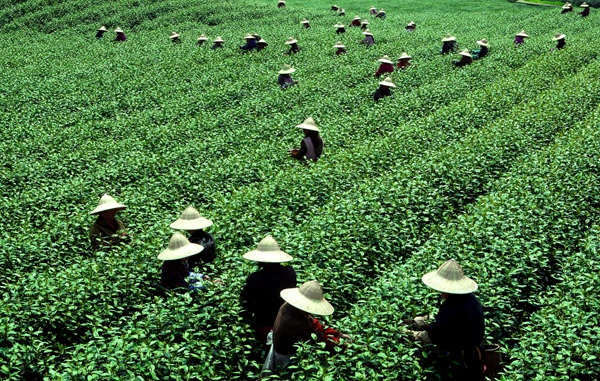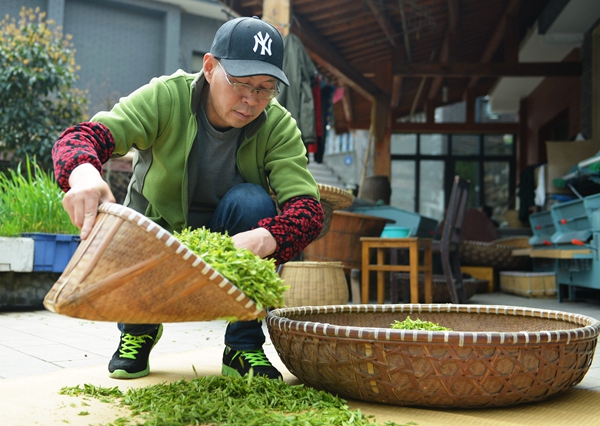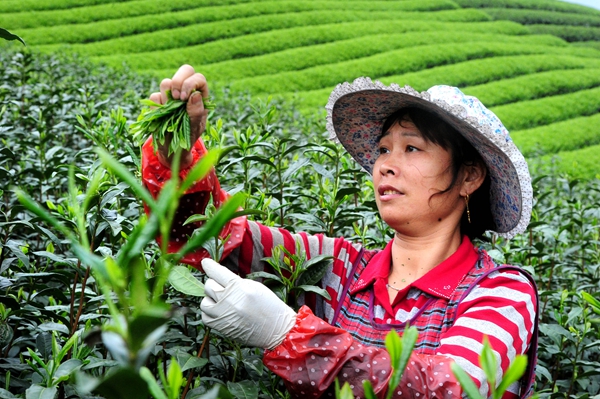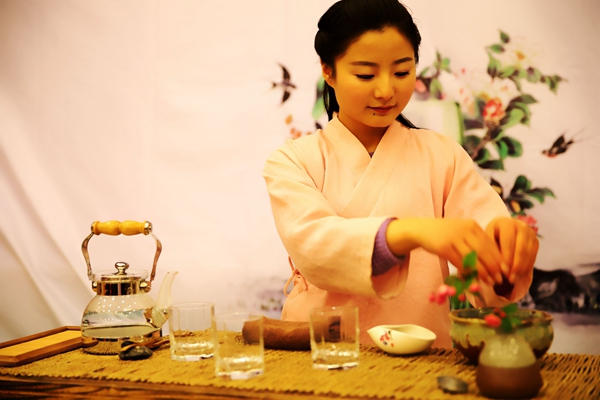Suning's online sales effort highlights tea's growing popularity
 |
|
Farmers pick Longjing tea leaves in Hangzhou, Zhejiang province. Westlake Longjing Tea, grown in Hangzhou and picked before the Tomb Sweeping Day on April 4 this year, is considered a top-end tea product, but its price still is unchanged from 2015. CHINA DAILY
|
The Chinese green tea market is taking on a distinctly modern feel, as e-commerce platforms team up with leading producers to meet growing consumer demand for the freshest leaves picked in early spring.
The time around Tomb Sweeping Day, on April 4, is among the tea market's busiest of the year, when tender shoots are picked to make the first batches of spring tea.
And with that selling window firmly in mind, Suning Commerce Group Co Ltd, the country's largest electronics retailer, launched a tea-selling campaign earlier this month on its group-buying site Ju.suning.com, which is already raking in orders.
The strategy is simple, said Wang Di, general manager at Ju.suning.
Partnering with 12 tea producers from eastern China, home to the country's most notable tea growing areas, he said the company has already been pre-selling the freshest spring tea to consumers, which helps reduce distribution channels and speeds up the delivery process.
"This is a typical, modern consumer-to-business model.
"We collect orders online, and the producers then make and package the tea, based on demand," he said.
The sales model not only allows consumers to quickly get what they want, but enables tea producers to gauge how much demand there will be, and make better-informed business decisions based on that, he says.
"Within three days of opening for pre-orders on March 9, we generated 86,500 orders, worth more than 11 million yuan ($1.7 million)," Wang said.
 |
|
A tea grower processes newly-picked Longjing tea leaves in his tea workshop in Hangzhou. LONG WEI/CHINA DAILY
|
Longjing, a type of green tea grown in Hangzhou, Zhejiang province, was the most popular with over 18,000 orders at an average price per order of 187 yuan, Suning figures show.
Other top-sellers have included Maofeng tea and Lu'an Melon Seed tea, also green teas.
"All of these orders will be delivered in April when tea producers finish the traditional elaborate tea-making process," Wang added.
But his company is not alone in adopting more modern approaches to the ancient trade, as Chinese consumers re-kindle their enthusiasm for drinking tea.
Last year, e-commerce rivals Alibaba Group Holding Ltd and JD.com both launched their own spring tea online promotions, to help tea-lovers access top-quality brands with just the click of a mouse.
According to the China Tea Marketing Association, e-commerce accounted for just 8 percent of total tea sales in 2014, but it is now the fastest-growing channel and is playing an increasingly important role in promoting tea, particularly to younger Chinese.
Wu Guangwu, who is in charge of marketing Shifeng Longjing tea at Wangyutai, a time-honored tea brand in China, said the chain has already embraced online selling.
 |
|
A woman picks Longjing tea leaves in Wuyi county, Zhejiang province. CHINA DAILY
|
The new model, he adds, is also an efficient way to curb the prevalence of fake products because fresh tea can be offered quicker straight from the growers, before knock-offs even appear.
But not everyone is buying the concept. Concern still exists among consumers that tea sold online may be of inferior quality.
One of them is Tan Tan, a 49-year-old white-collar worker in Bazhong, Sichuan province, who has been a regular tea drinker for a decade.
"Online ordering is convenient. I am quite open to the new approach but only on the premise that tea sold online must be genuine and of the same quality as those sold in brick-and-mortar stores."
Late cold snap affects harvesting of Westlake Longjing
This year's first batch of Westlake Longjing tea, a well-known variety of top-end green tea produced in Zhejiang province, went on sale on March 17, its earliest offer in 20 years.
Traditionally picked just prior to Tomb Sweeping Day, which falls on April 4 this year, the most expensive Longjing tea is priced similar to last year, said sellers.
Wuyutai Tea, one of Beijing's oldest distributers, has bought around 75 kilogram of Westlake Longjing, priced at about 8,200 yuan ($1,264.44) per 0.5 kilogram, said Sun Danwei, Wuyutai's general manager.
"There's not a lot of Longjing tea available this year, as harvesting of the crop was affected by a late snowfall on March 10."
 |
|
A worker performs a tea art ceremony in the Lanyi Teahouse in Suzhou, Jiangsu province. LONG WEI/CHINA DAILY
|
The company collected its first batch of the tea before the snow came, Sun said, but the quality of this year's harvest has not been affected, as temperatures rose quickly after. It did, however, mean that 20-30 percent less tea was picked before its traditional time.
Some of China's major tea-growing areas were affected by the late snow flurry, such as Sichuan province, Guangdong province and Anhui province, which in turn slowed the growth of spring varieties, according to China Tea Marketing Association, which is now expecting lower yields than last year.
On the plus side, officials said that the cold snap did manage to kill off pests which might have affected the crop later. They insist the quality of spring tea will be unaffected, but concede average prices will be a little higher than last year, as a result.
"We lost six growing days because of the cold wave," said Chen Gang, general manager of Chuan Hong Group, a Yibin, Sichuan province-based tea group, who says it will be increasing production to make up, as the weather gets warmer.
Yibin is considered the birthplace of Chinese tea, and its spring teas have the earliest harvest seasons of any areas at similar latitudes.
By MA SI/WANG WEN (China Daily)
Using WeChat? Scan QR Code or Press the Fingerprint Below ↓
--- (Or ADD WeChat ID: OKOKOKOKnet)
